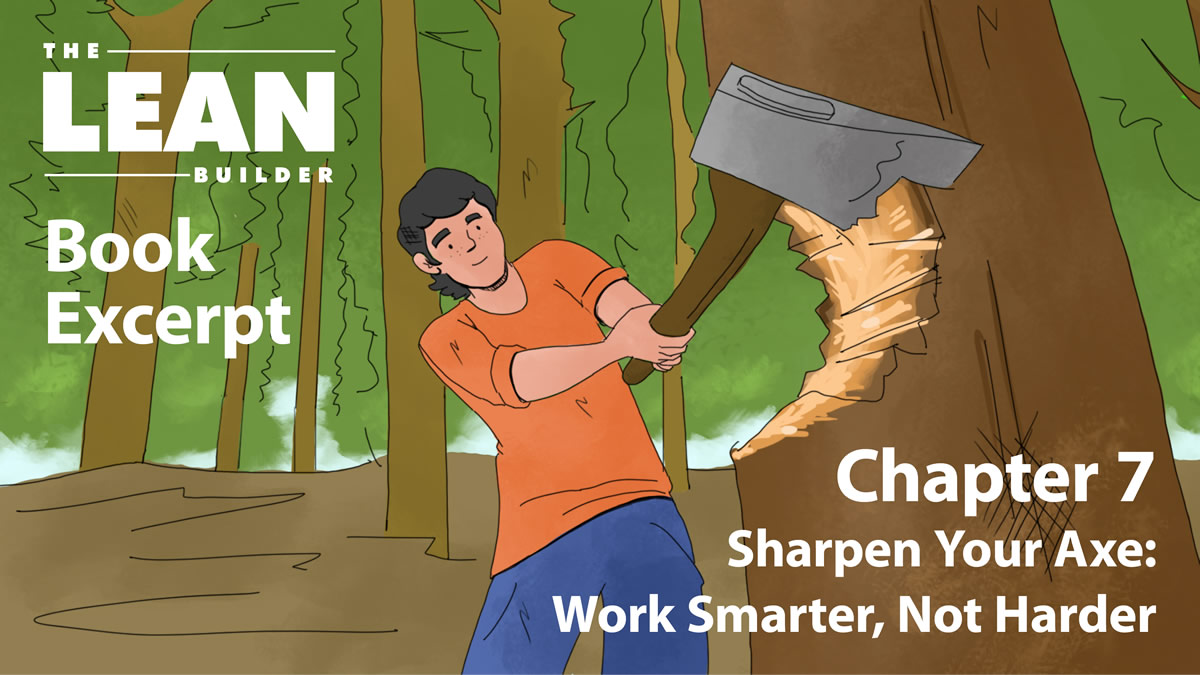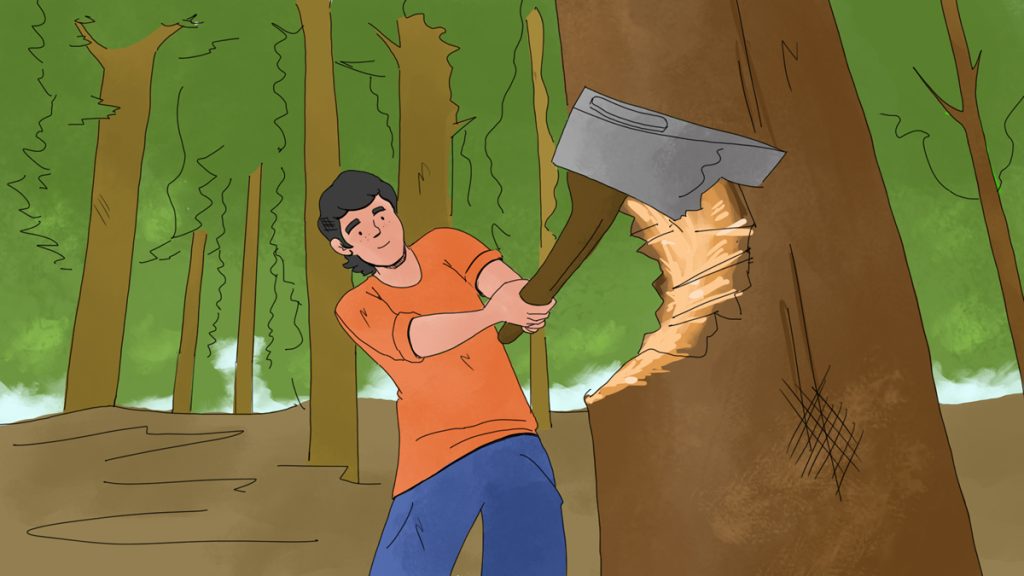This week, we’re sharing an excerpt from our book The Lean Builder: A Builder’s Guide to Applying Lean Tools in the Field. In chapter 7, “Sharpen Your Axe: Work Smarter, Not Harder”, Sam and Alan go on a road trip, which affords Alan the opportunity to share a story about a friendly competition with his dad—and, ultimately, how this experience led him to think differently about his approach to working lean:
“I realized that I had not sharpened my camping axe, but—more importantly, over the last thirty years—I had not ‘sharpened my axe’ when it came to my craft. I just came in, day in and day out, and wore myself out, chopping away at the wood with a dull blade. I knew I needed to ‘sharpen my blade’ at work; I needed a new way to approach an industry that was changing, and maybe leaving the old guys like me behind.”
We hope you enjoy!
“Alan, all of this stuff you’ve been teaching me…how long have you been into this and implementing it at ProCon Builders?”
“Lean Construction?” Alan thought for a minute. “I reckon it’s been a little over five years.”
Sam was surprised. “Only five years? Wow, I would have thought it was a lot longer than that. From what I’ve been told by other superintendents, you’ve never had a job that lost money or finished late. Why would you change the way you run work five years ago if what you did before that obviously worked so well?”
“Is that what they say?” Alan asked, laughing. “Well, it’s true that most of my projects have been winners; however, over time I started noticing that the industry was changing. What it took to get jobs to the finish line was starting to require more work and create more stress.”
“Really? What changed?”
Alan whistled. “Short answer? Everything. The long answer starts with construction documents. Early in my career, the design teams had more time to put together a package of drawings. Architects drew each detail by hand, which required more thought and planning up-front. But today, the construction documents aren’t what they used to be—and that’s not a dig at our architect partners. It’s the demand for their services, and a need for everything to happen faster, which leads to our reliance on technology—just the way our industry has evolved.
“But it’s not just that. The craftsmen aren’t what they once were, either. Growing up, master carpenters were like artists. Being an ironworker or a mason was something to aspire to. A lot of kids were interested in getting into the trades when they finished high school, but not anymore. For some reason, the idea of working with your hands has a negative connotation in our society today, and all the emphasis is on going to college. Don’t get me wrong, there’s nothing wrong with college. Elsie was an educator for thirty years, and she pushed so many students to achieve a good education, perhaps so they could get into college. But I think we do kids a disservice when we don’t let them see that they can build a good career and make good money in the construction industry.
“Anyway, the point here is that, as a consequence, there aren’t enough craftsmen to go around, and the craftsmen that we do have just don’t know the documents like they used to. They’re spread too thin or pulled in too late. You know, nowadays, it is not a surprise if a foreman comes to your job for the first time and they haven’t looked at the documents yet. Again, like with our designer friends, this is not the trade partner’s fault. This is the reality of the world our trade partners live in based on the current industry demand.”
Sam was blown away. He hadn’t known the construction industry to be any different from the way it was today, but Alan had a distinctly different view.
“But you asked what changed for me, and the answer is that a little over five years ago I finished the hardest project of my career to that point. And it shouldn’t have been that way, but long story short is we made it by the skin of our teeth. It wiped me out and had me feeling pretty low about the current state of affairs in our business. I needed a break, so Elsie and I loaded up the fifth wheel and headed for the mountains of Montana, close to where I spent a lot of time growing up as a child. We set up our campsite, and I realized I hadn’t packed enough firewood for the trip, so I needed to go out and secure some more to get us through the first few nights.
“As I got the hatchet out of the storage bin in the back of the camper, I ran my thumb across the blade, and noticed that it had been a while since I sharpened the blade of my camping hatchet. I struggled for close to an hour, chopping away at dead limbs, and when I got back to the campsite Elsie joked and reminded me that I’m not as young as I used to be, owing to the fact I looked pretty worn out for such a small stash of firewood. Later that evening, after Elsie had gone to bed, I was enjoying the last of the fire and my mind wandered to something I learned from my father…”
Alan liked to talk and started to feel like he was chattering away too much. “Sam, sorry to bend your ear so much this morning. Do you mind if I tell you a story that will help explain the reason for the shift in how I view work?”
Sam, who’d always been captivated by Alan’s storytelling, had just been thinking how much this reminded him of other road trips with Alan when he was a kid. Alan was full of stories and had a great way of telling them—even if you’d heard them before, you still wanted him to tell them again. Sam urged him to go on.
“It was early summer, going into my senior year of high school, and I was confident—some may say cocky—in my physical abilities as a young man. After breakfast early one Saturday morning, my old man asked me to clean the horse stalls, put down fresh bedding, and do a few other chores I loathed while he went out to down a handful of mature trees to get the lumber he needed for a new loafing shed.
“Being the cavalier young man that I was, I joked and asked if his back was up to the task. My dad lowered his chin, raised his eyebrows, and looked down at me over the top of his glasses like I was a small curiosity.
“‘Don’t think your old man still has it in him, huh?’ he asked me, impassively.
“I smiled in my haughty way and suggested maybe he should take care of the stalls and leave the tree cutting to me.” Alan chuckled at the memory.
“So, my dad says, ‘I tell you what, son. Why don’t you grab your axe, and I’ll grab my axe, and we’ll see who can drop the most trees before the lunch bell rings. Fella with the most downed trees doesn’t have to clean the stalls.’
“My mouth moved a lot faster than my brain did back then, and I wanted to show my old man just how good I was. So, I popped up quick from the breakfast table and we shook on it. I grabbed my axe without so much as a backwards glance or another thought in my head, and we took our positions in the forest and commenced to chopping. I was confident with every swing I took and thought to myself, There is no way my old man is beating me today.
“What gave an even bigger boost to my confidence, like I needed it, was I could hear my father at work a couple hundred yards away from me, and every hour or so his axe would go silent for five or ten minutes. I just knew I had him licked, as I believed he was running out of gas, so when he was at rest I doubled my effort. I pushed myself twice as hard and gave it everything I had. As the mid-day sun started to take its place in the sky, I was dripping with sweat and pretty much useless, but I had no doubt that I’d bested my father that day.
“Satisfied with myself, I made my way back to where we parted to find him waiting for me with a certain kind of smile on his face. Over the next hour we walked together and counted the trees we’d both cut down; I couldn’t believe it—the old man annihilated me. It wasn’t even close, almost two to one.
“I felt like my eyes were lying to me—and if I’m honest, I was pretty raw about it, as that was a lofty perch he’d pushed me from.” Sam laughed at this, and Alan grinned.
“I asked him, ‘How did you do it? I heard you sucking wind at the end of every hour!’
“He said, ‘You’re right, I was tired, but what you heard was not me just taking a breather. I was also sharpening my axe, son.’ Already knowing the answer, he asked me, ‘How many times did you sharpen your axe today?’
“My face grew hot with the realization of my foolishness. I confessed that it hadn’t occurred to me to sharpen my axe all morning; my mind was singularly fixated on beating him at chopping wood.
“‘And how many times did you break to renew yourself?’ he prodded.
“‘None, sir,’ I replied, miserably.
“Taking pity on me, he complimented me on how hard I’d worked. But then he explained that one of us worked harder and the other worked smarter—and that smart working beats hard working any day of the week. He taught me that I didn’t need to wear myself out to win; I needed to keep my blade sharp and my body rested to preserve my stamina.”
Alan was quietly reflective for a moment. Then he added, “The old man was right, and he usually was.”
Sam had heard a lot of stories about Alan’s dad over the years, some several times (including this one), and this was probably his favorite one. Sam noticed that these stories always seemed to end with, “The old man was right, and he usually was.” It was clear to Sam how much Alan had respected and loved his dad.
Alan cleared his throat. “Anyway, his lesson came back to me as I sat around the campfire that night. Of course, I realized that I had not sharpened my camping axe, but—more importantly, over the last thirty years—I had not ‘sharpened my axe’ when it came to my craft. I just came in, day in and day out, and wore myself out, chopping away at the wood with a dull blade. I knew I needed to ‘sharpen my blade’ at work; I needed a new way to approach an industry that was changing, and maybe leaving the old guys like me behind. From that trip came my big ‘ah-ha moment.’
“When I got back to Dallas, I started asking every trade partner and architect I knew if there was something they had seen or heard of that took a different approach to the way things had always been in the construction industry. And from that curiosity, I was introduced to Lean Construction. I took in everything I could find, read books, and started going to Community of Practice meetings. The more I learned, the more I liked it and the more it all made sense. Then I started to add elements of it to my jobs, and before long I could tell that I was working smarter. And the rest, as they say, is history.”
Sam thanked Alan for sharing the story, and the truck was relatively quiet for the remainder of the drive to the marina. He replayed Alan’s story in his mind and, as he did, he couldn’t help but think about his own life and career. He wondered if he had ever really taken the time to “sharpen his blade.” He felt like he had always looked to continuously improve in all of the categories that were important to him—physically, socially, spiritually. But with how much thoughtful intent? And what about his work, and his career?
Sam was still chewing on these thoughts as he boarded the fishing guide’s boat to head out.










